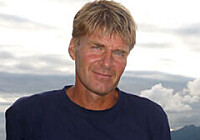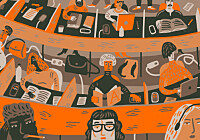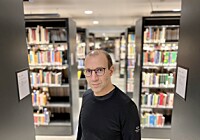Debatt ● Ahmed Abouzeid
«Without idealism, we replicate the same old ruins we suffer from and resist»
In a world often distorted by cruelty and suffering, hope and idealism become intertwined as powerful forces of resistance and change.

This is my voice for those
who care to listen; I am a member of the NTNU Academic Network and Students for
Palestine. I contemplate the essence of conscience for us as scientists,
academics, students, or as humans in general. Is it merely an emotion, a self-critical mechanism,
a random phenomenon, or is it to unify us, much like leaves on a tree bound by
implicit or explicit
shared values? Reflecting on our existence as matter from the universe, I
wonder: What defines
the space between us—as fractions of that matter? Is it the physical distance
between us, or the depth of our interconnectedness through conscience?
It's magical in my heart to envision distant elements converging to form a tree in critical moments of history, and those who perceive this are fortunate—I believe. It's as if those blessed with such vision possess a unique ability to perceive beyond the surface, delving into the depths of our thoughts and emotions, in search of our true selves. Perhaps this better defines the word "RESISTANCE"; perhaps freeing ourselves is to go within the process of connecting to all and freeing all, not the other way around! Indeed, I see conscience as more than just an individual phenomenon, rather a magical medium that connects us, as if it has a crucial role to play in the history of time.
In a world often distorted by cruelty and suffering, hope and idealism become intertwined as powerful forces of resistance and change. Idealistic thinking, far from being naive, is an essential expression of hope that refuses to surrender to the normalized hardships of life. It is about envisioning a better world and believing in values that can transform our reality. This journey of hope is not without its challenges. It involves recognizing our fears, understanding our judgments, staying beyond dogma, and holding onto dreams of a world free from oppression and selfishness. Honour and collective emotions play crucial roles in this struggle, guiding us to act with empathy and integrity.
Without idealism, we replicate the same old ruins we suffer from and resist. Idealism transforms our brutal world into a new one, and the moment we believe and practice idealistic values, they become realistic. This is how I define hope—a persistent journey of striving to realize an idealistic dream, never losing faith no matter what. As Plato described the shadow as an illusion, I see the surrender and the insecurity one feels to change the current state of the world as equally illusory. Plato describes a group of people who have lived chained in a cave since childhood, facing a blank wall. They see only shadows cast by objects behind them, which they perceive as reality. When one of them is freed and sees the outside world illuminated by the sun, he realizes the shadows were mere illusions. I add, our shadow is just one useless reflection of our existence, there must be more shades of reflections.
Conscience, hope, idealism, sadness, and student activism are all interconnected, as is everything else.
Ahmed Abouzeid
On one hand, yes, there is sadness that neutral ones are escaping from, because it fuels this struggle. But one day we might see sadness as a romantic, beautiful energy that remains honest and faithful to the dream. Honour, on the other hand, defines us in upholding that struggle as well. We are honourable when we celebrate our emotions, no matter what they are, but it is important to keep purifying ourselves in that regard, as emotions can be beautiful for an individual but could hurt others. I believe in collective emotions the same way I believe in collective resistance. All of this is what truly frees us and could make a difference.
Revolution happens and succeeds when we as individuals learn to connect through all these perspectives, when the one becomes all and all becomes one. There have been radical changes throughout history that I ponder deeply, such as individual liberation and collective liberation witnessed in capitalism and communism, respectively. Both systems ignored their opposite targets, trying to free all by ignoring the individual and trying to free the individual by ignoring all. Perhaps that is one of our biggest ideologically produced historical circumstances. I see the individual and the collective in a dialectic relationship that exists but is often misunderstood. It has always been easier to drop one in favor of the other. What if the magic lies in that space between us? What if we try to understand that space and see through it more clearly? I come from a beautiful land called “Egypt”, which partially means “House”, where periodic standing against dictatorship made me see many times that we can truly connect, giving and taking a hand on an equal basis.
Perceiving the battle against oppression during various forms of activism, whether symbolic or more grounded, requires a deep understanding of the struggle, and us as academics or students and our role in this world. An activist must see themselves as literally fighting a war against the ruins of a devastated world and its representatives: academic oppression, colonialism, racism, selfishness, and misguided justification of other kinds of injustices.
In this fight, an activist must perceive themselves as caring, intelligent, and strong. They must be empathetic, understanding the emotional weight of those oppressed. They should be strategic, using their intellect to navigate complex situations and devise effective solutions. They must also be resilient, able to withstand the challenges and setbacks that come with fighting for justice.
Symbolic activism, such as protests, art, and online campaigns, serves to raise awareness and create a shared sense of purpose. Grounded activism, such as community organizing, policy advocacy, and direct action, works to implement tangible changes. Both forms are essential, and activists must navigate them with a clear perception of their role.
Conscience, hope, idealism, sadness, and student activism are all interconnected, as is everything else. They define our struggles and shape our reality. By understanding and embracing these elements, we can create a world where individuals, academic institutions, and all thrive together, transforming our dreams into reality and finding the magic in the space between us. This is the journey of true liberation; a persistent and honourable pursuit of a better world for all. Therefore, the interest of academics and students in such phenomenological reflection is not just a choice but a necessity on our path to becoming responsible human beings. This is my voice, and I am confident it resonates with many of us at NTNU Academic Network and Students for Palestine.














